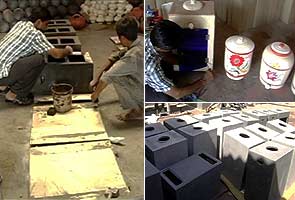Hamburgs Bürgermeisterin besucht Graduation-Feier des NIT
02.09.2011

Hamburgs Wissenschaftssenatorin Dr. Dorothee Stapelfeldt mit DAAD-Preisträger Vivek Ghewari aus Indien. Foto: Hauke Gilbert
Hamburgs Wissenschaftssenatorin Dr. Dorothee Stapelfeldt ist heute Gastrednerin der Graduation-Feier des Northern Institutes of Technology Management (NIT) an der TU Hamburg im Audimax. Es ist der erste Besuch der Zweiten Bürgermeisterin am NIT. Das begehrte Abschlusszertifikat nehmen 31 Absolventen aus zehn Nationen entgegen. Zwei Jahre hatten die angehenden, vorwiegend internationalen Ingenieurinnen und Ingenieure am NIT und an der Technischen Universität Hamburg-Harburg (TU Hamburg-Harburg) studiert und eine praxisnahe Doppelqualifikation in Technik und Management erhalten. Dabei konnten sie auch wertvolle Erfahrungen in Partnerunternehmen sammeln.
Wissenschaftssenatorin Dr. Dorothee Stapelfeldt gratulierte den Absolventinnen und Absolventen und betonte den Erfolgt des NIT: „Von 32 Studienanfängerinnen und -anfängern haben 31 ihren Abschluss geschafft – eine fast hundertprozentige Erfolgsquote. Das ist im Hochschulbereich schon sehr bemerkenswert. Eine besondere Stärke der Ausbildung am NIT ist es, dass die Studierenden neben technischen und betriebswirtschaftlichen Kompetenzen auch ethische Grundlagen als Leitlinien unternehmerischen Handelns vermittelt bekommen. Von den hier gemachten Erfahrungen werden sie im weiteren Berufsleben profitieren können.“ […]
Im Rahmen der Feierstunde überreichte Senatorin Dr. Stapelfeldt auch den renommierten DAAD Study Award des Deutschen Akademischen Auslandsdienstes (DAAD). Den mit 1.000 Euro dotierten Preis erhielt der 24-jährige Vivek Ghewari aus Indien für seine hervorragenden Studienleistungen und aufgrund seiner besonderen interkulturellen Offenheit und seines Engagements im studienbegleitenden Umfeld.
Vivek Ghewari ist Stipendiat der Leopold Kostal GmbH & Co. KG, wo er bereits während seines Studiums Praxisluft schnuppern konnte. Das in der vierten Generation geführte Familienunternehmen mit Hauptsitz in Lüdenscheid und weltweit etwa 12.000 Mitarbeitern in 17 Ländern fördert den talentierten indischen Studenten bereits seit Beginn seines Studiums. Aufgrund der hervorragenden Erfahrungen mit Vivek Ghewari erwägt die Kostal GmbH, auch weiterhin Stipendien am NIT zu vergeben.
Seine Zukunft sieht der DAAD-Preisträger im Sektor der erneuerbaren Energien. So möchte Ghewari die Standortplanung neuer Projekte auf diesem Gebiet sowie den Aufbau der dafür benötigten logistischen Netzwerke vorantreiben. Dabei ist ihm soziales Engagement ebenso wichtig wie seine Karriere. „Ich könnte mir vorstellen, in einigen Jahren einen Kindergarten oder eine Schule in meinem Heimatland aufzubauen“, sagt er. Privat findet Vivek Ghewari seine Ruhe und Kraft im Yoga.
Für weitere Informationen:
NIT Marketing & PR Department
Daphna Horwitz, Dörthe Grötsch
Tel: 040 – 42878 – 3788
daphna.horwitz@nithh.de
doerthe.groetsch@nitthh.de
TUHH – Pressestelle
Jutta Katharina Werner
E-Mail: j.werner@tu-harburg.de
Tel.: +49 40 / 428 78 – 4321
Fax: +49 40 / 428 78 – 2070


 Last few years have seen the rise of several new and dynamic paradigms in innovation management, e.g. the “Bottom of the Pyramid” (BOP) or “Frugal Innovations”. These seek to motivate firms to develop affordable and good-quality products for rural and/or poor customers especially in developing economies. Such ideas, though admirable in their own right, have in many instances however failed to fully appreciate and utilize the power of innovative ideas and the rich heritage of traditional knowledge emerging at “
Last few years have seen the rise of several new and dynamic paradigms in innovation management, e.g. the “Bottom of the Pyramid” (BOP) or “Frugal Innovations”. These seek to motivate firms to develop affordable and good-quality products for rural and/or poor customers especially in developing economies. Such ideas, though admirable in their own right, have in many instances however failed to fully appreciate and utilize the power of innovative ideas and the rich heritage of traditional knowledge emerging at “ Many local users in rural areas come up with inventions
Many local users in rural areas come up with inventions The idea of “grassroot innovations” has been popularized by untiring and inspiring efforts of Prof. Anil Gupta, winner of
The idea of “grassroot innovations” has been popularized by untiring and inspiring efforts of Prof. Anil Gupta, winner of 
